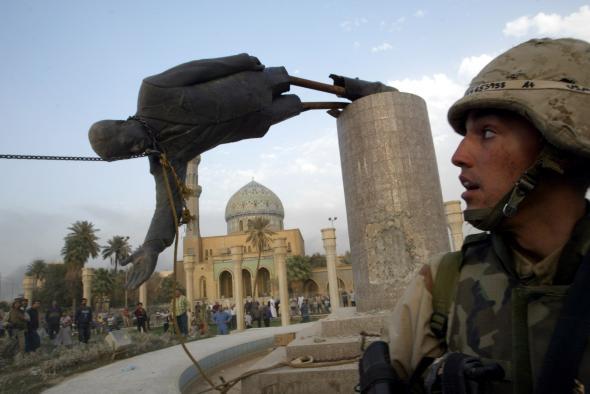
Goran Tomasevic AS/CRB/Reuters
One of the few areas of agreement between George W. Bush’s administration and the human rights community was that the United States was not at war, after 9/11, with the entire religion of Islam. The younger Bush’s address to the nation on Sept. 20, 2001, made clear that he believed that the jihadi terror ideology was a perversion of Islam, not part of it:
I also want to speak tonight directly to Muslims throughout the world. We respect your faith. It’s practiced freely by many millions of Americans and by millions more in countries that America counts as friends. Its teachings are good and peaceful, and those who commit evil in the name of Allah blaspheme the name of Allah. The terrorists are traitors to their own faith, trying, in effect, to hijack Islam itself. The enemy of America is not our many Muslim friends. It is not our many Arab friends. Our enemy is a radical network of terrorists and every government that supports them.
(Thanks to Alex Yablon for pointing to that excerpt.)
Bush’s statement was more than just a matter of principle. His administration considered alliances with Middle Eastern nations a strategic imperative of the so-called “War on Terror.” The U.S. also presented its invasion of Iraq as a means to create a democratic ally in a Muslim-majority nation at the heart of the Muslim world.
This plan was, to make a massive understatement, an extremely imperfect one, executed poorly, with disastrous consequences. But the Bush administration did at least recognize that its actions in Iraq had created a political and moral obligation to support the country. “If you break it, you own it,” Colin Powell famously said.
The Obama administration continued under this assumption. In addition to supporting Iraq’s military against ISIS, the U.S. under Bush and Obama has accepted Iraqi refugees, with special attention given to Iraqis who worked with the U.S. military or other American entities. (Those individuals are at high risk of being murdered by jihadis.)
The executive order signed by Donald Trump on Friday bans citizens of seven majority-Muslim countries, including Iraq, from entering the United States, and effectively halts the program described above. It bans all Iraqis, including holders of U.S. green cards, from entering the United States for 90 days after the signing of the executive order. It bans all refugees, from anywhere, for 120 days after the signing of the executive order.
Some Iraqis with visas that were already issued have reportedly been prevented from boarding flights. There are already reports of Iraqi soldiers—who are literally our current allies in a shooting war with ISIS—calling the order a “massive disappointment.”
There’s a long-standing norm in the United States that former presidents don’t criticize their successors. Under normal circumstances, this is a sound tradition. Present circumstances, however, are not normal. George W. Bush—not to mention Barack Obama—must condemn the United States’ betrayal of a nation to whom every American owes a great moral debt.